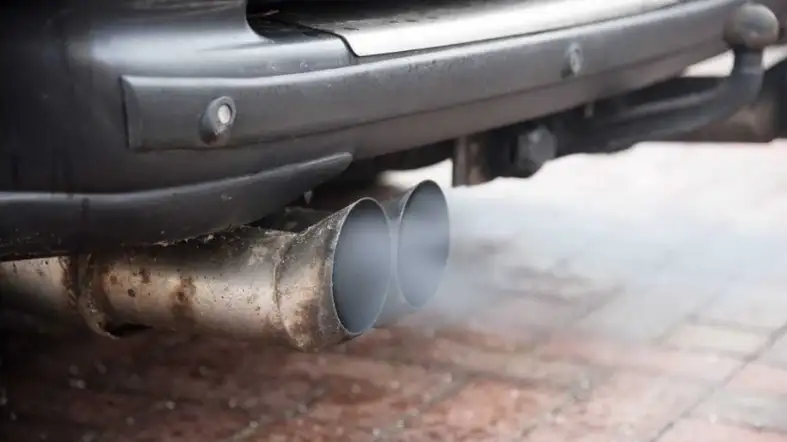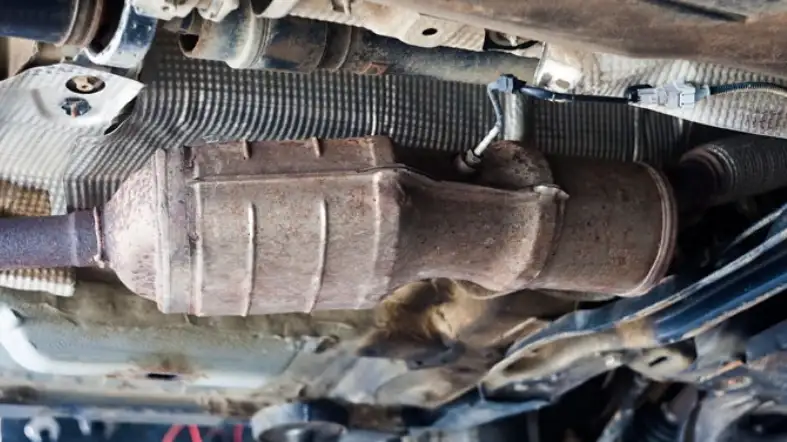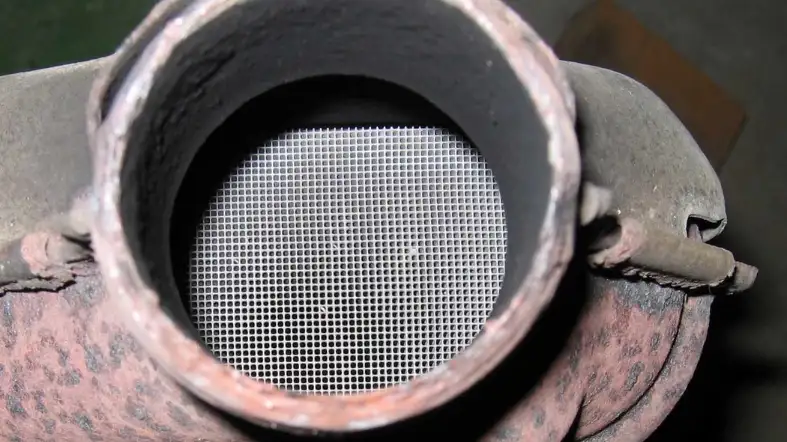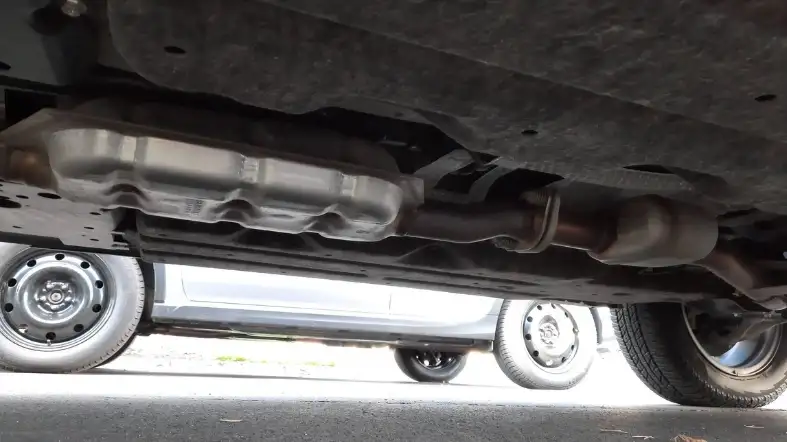Have you ever wondered what would happen if you drove your car with a bad catalytic converter?
Maybe you’ve noticed a decrease in fuel efficiency, or strange noises coming from your engine, but you’re not sure what the root cause might be.
In this blog, we’re going to take a deep dive into the world of catalytic converters and explore the potential consequences of driving with a faulty one.
From reduced performance to environmental damage, we’ll cover it all!
What happens if you drive with a bad catalytic converter?
If you drive with a bad catalytic converter, your car’s emissions of harmful pollutants may increase significantly.

The catalytic converter is an important component in your car’s exhaust system.
It converts harmful gases like carbon monoxide, nitrogen oxides, and hydrocarbons into less harmful substances before they are released into the air.
When a catalytic converter is damaged or not functioning properly, it may not be able to effectively filter out these harmful pollutants.
This can lead to increased emissions. This not only harm the environment, but can also cause your car to fail an emissions test or even lead to a ticket or fine.
Moreover, a bad catalytic converter can cause your car to run poorly, with symptoms like reduced power, decreased fuel efficiency, and a rough idle.
So it’s important to address any issues with your catalytic converter as soon as possible.
What are the Symptoms of a Bad Catalytic Converter?
When the catalytic converter is not functioning properly, it can cause a number of symptoms.
Here are some common signs that you may have a bad catalytic converter:
1. Decreased engine performance:
If your car’s acceleration and power seem sluggish, it may be due to a clogged or damaged catalytic converter.
This is because the converter is designed to filter out harmful emissions, and when it fails, it can restrict the flow of exhaust gases and reduce engine performance.
2. Reduced fuel efficiency:
A bad catalytic converter can also cause your car to use more fuel than normal.
This is because the converter is not able to properly convert the pollutants in the exhaust into less harmful emissions, which can cause your car’s engine to work harder and use more fuel.
3. Strange noises:
If you hear unusual noises coming from your car’s exhaust system, it may be a sign of a bad catalytic converter.
These noises can include rattling or hissing sounds, and may be caused by loose or damaged parts inside the converter.
4. Foul smells:
A bad catalytic converter can also cause your car’s exhaust to emit unpleasant odors, such as a rotten egg smell.
This is because the converter is not able to properly convert the sulfur in the exhaust into less harmful compounds, which can cause the smell.
5. Check engine light:
Finally, if your car’s check engine light comes on, it may be a sign of a bad catalytic converter.
This is because the car’s onboard computer system is able to detect when the converter is not functioning properly, and will signal an alert to the driver.
If you notice any of these symptoms, it’s important to have your car inspected by a qualified mechanic.
What are the causes of Causes of Catalytic Converter Failure?

Let’s take a look at some of the most common causes of catalytic converter failure:
1. Contamination:
One of the main reasons a catalytic converter can fail is due to contamination.
This can happen if the engine is burning oil or if there are excessive levels of sulfur in the fuel.
Over time, these contaminants can build up on the catalytic converter’s surface, reducing its effectiveness and causing it to fail.
2. Physical Damage:
Another cause of catalytic converter failure is physical damage.
This can happen if the vehicle runs over a speed bump or hits a pothole, causing the catalytic converter to crack or break.
Additionally, damage can occur if the converter comes into contact with road debris or is struck by an object.
3. Overheating:
Catalytic converters can also fail due to overheating. This can occur if the engine is running too hot or if there is a malfunction in the ignition system.
Overheating can cause the catalytic converter to melt or break down, rendering it ineffective.
4. Age and Wear:
Catalytic converters are not designed to last forever and will eventually wear out over time.
This can happen due to normal wear and tear, as well as exposure to the elements like heat and moisture.
When a catalytic converter reaches the end of its useful life, it will need to be replaced.
5. Improper Installation:
Finally, catalytic converter failure can also occur due to improper installation.
If the converter is not installed correctly, it may not function as intended and could fail prematurely.
It’s important to have your catalytic converter installed by a qualified professional to ensure it is properly installed and functioning correctly.
How to fix a bad catalytic converter?

If you suspect that your catalytic converter is not working correctly, it is essential to get it fixed as soon as possible.
Here are some steps you can take to fix a bad catalytic converter:
1. Diagnose the Problem:
The first step in fixing a bad catalytic converter is to diagnose the problem.
There are several symptoms of a faulty catalytic converter, including a decrease in power, a decrease in fuel efficiency, and an increase in emissions.
You can use a diagnostic tool to check for error codes related to the catalytic converter.
2. Replace the Catalytic Converter:
If your catalytic converter is beyond repair, you will need to replace it.
A new catalytic converter can be expensive, but it is essential for your vehicle’s performance and the environment.
You can purchase a replacement catalytic converter from an auto parts store or an online retailer.
3. Clean the Catalytic Converter:
In some cases, a dirty catalytic converter can cause performance issues.
You can clean the catalytic converter by using a special cleaning solution designed for this purpose.
Be sure to follow the manufacturer’s instructions carefully and wear protective gear.
4. Repair or Weld the Catalytic Converter:
If your catalytic converter has a minor issue, such as a crack or leak, it may be possible to repair or weld it.
However, this should only be done by a professional mechanic, as it can be dangerous and may not be legal in some states.
5. Check the Oxygen Sensor:
The oxygen sensor is a critical component in the exhaust system, and it can also affect the catalytic converter’s performance.
If your oxygen sensor is faulty, it can cause the catalytic converter to malfunction.
You can check the oxygen sensor with a diagnostic tool or by taking your car to a mechanic.
How to prevent catalytic converter problems?

Here are some tips to help prevent catalytic converter problems:
1. Regular Maintenance:
Regular maintenance of your vehicle is essential to prevent catalytic converter problems.
Schedule routine tune-ups and check-ups with a qualified mechanic to ensure that your car’s engine is running correctly.
Regular oil changes and air filter replacements can also help prevent catalytic converter issues.
2. Use the Right Fuel:
Using the right fuel for your car is crucial to prevent catalytic converter problems.
Always use the recommended grade of gasoline for your vehicle, and avoid using low-quality or contaminated fuel that could damage your car’s engine or catalytic converter.
3. Avoid Overheating:
Overheating is one of the main causes of catalytic converter failure.
Make sure your car’s cooling system is functioning correctly, and avoid driving your car for extended periods in hot weather or in heavy traffic.
Pull over and let your engine cool down if you notice the temperature gauge starting to rise.
4. Keep Your Exhaust System Clean:
Keeping your exhaust system clean is essential to prevent catalytic converter problems.
Make sure the exhaust pipes and muffler are free of debris and dirt, and have any damaged or corroded parts repaired or replaced promptly.
5. Don’t Ignore Check Engine Lights:
If your car’s check engine light comes on, don’t ignore it.
This could be a sign of a problem with your car’s engine or emission control system, including the catalytic converter.
Have your car checked by a qualified mechanic as soon as possible to prevent further damage or costly repairs.
6. Drive Responsibly:
Driving responsibly can also help prevent catalytic converter problems.
Avoid aggressive driving, excessive idling, and driving with heavy loads or towing heavy trailers.
These can put extra strain on your car’s engine and exhaust system, leading to catalytic converter issues.
FAQs
What Is A Catalytic Converter, And What Does It Do?
A catalytic converter is a device that is part of your car’s exhaust system. It’s responsible for converting harmful pollutants in the exhaust gases that come out of your car’s engine into less harmful gases, so that they don’t harm the environment.
How Do I Know If My Catalytic Converter Is Bad?
There are a few signs that your catalytic converter might be going bad, including a decrease in your car’s performance, a drop in your fuel efficiency, and a strange smell coming from your exhaust.
You may also notice that your “Check Engine” light comes on.
If you suspect that your catalytic converter is bad, it’s important to get it checked out by a professional mechanic.
Can I Replace My Catalytic Converter Myself?
While it is possible to replace your catalytic converter yourself, it’s not recommended unless you have experience working on cars.
It can be a difficult and complicated process, and if you make a mistake, it can cause even more problems.
It’s best to take your car to a professional mechanic to have the catalytic converter replaced.
How Much Does It Cost To Replace A Catalytic Converter?
The cost of replacing a catalytic converter can vary depending on the make and model of your car, as well as where you live.
In general, it can cost anywhere from a few hundred dollars to over a thousand dollars.
It’s important to get a quote from a professional mechanic before having the work done so that you know what to expect.
Conclusion
Driving with a bad catalytic converter can have serious consequences for both your car and the environment.
A faulty converter can cause your car to run poorly, with reduced power and increased fuel consumption.
It can also lead to increased emissions of harmful pollutants, which can harm both the air quality and the health of those around you.
It’s important to have your catalytic converter checked regularly and replaced if necessary to ensure your car is running smoothly and doing its part to protect the environment.
